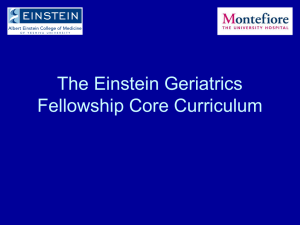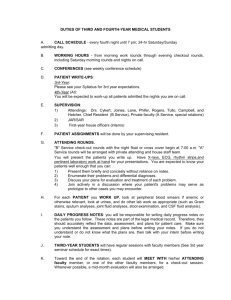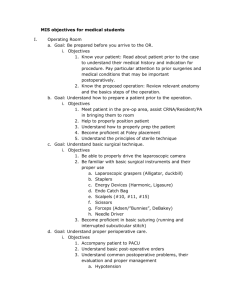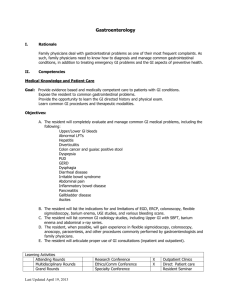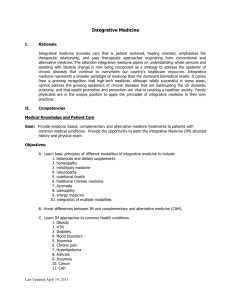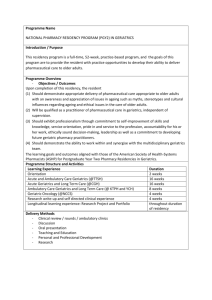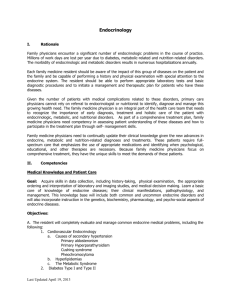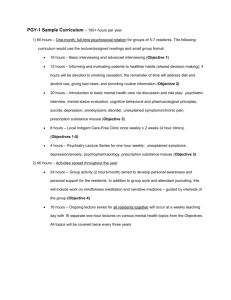Geriatrics Curriculum - Department of Family & Preventive Medicine
advertisement
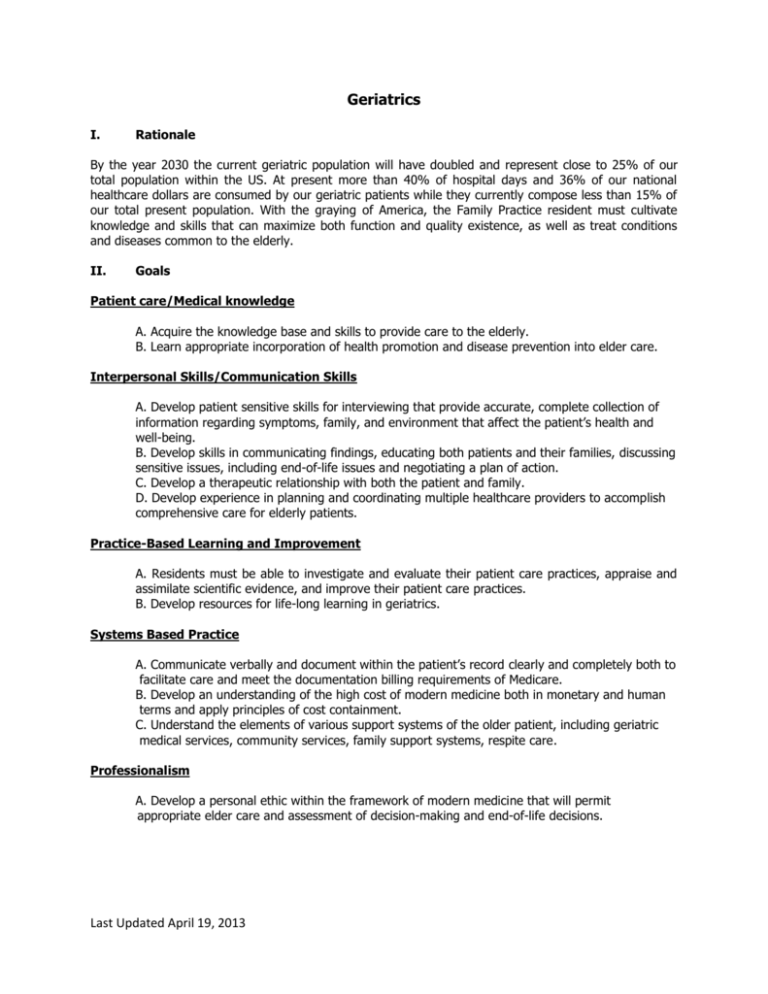
Geriatrics I. Rationale By the year 2030 the current geriatric population will have doubled and represent close to 25% of our total population within the US. At present more than 40% of hospital days and 36% of our national healthcare dollars are consumed by our geriatric patients while they currently compose less than 15% of our total present population. With the graying of America, the Family Practice resident must cultivate knowledge and skills that can maximize both function and quality existence, as well as treat conditions and diseases common to the elderly. II. Goals Patient care/Medical knowledge A. Acquire the knowledge base and skills to provide care to the elderly. B. Learn appropriate incorporation of health promotion and disease prevention into elder care. Interpersonal Skills/Communication Skills A. Develop patient sensitive skills for interviewing that provide accurate, complete collection of information regarding symptoms, family, and environment that affect the patient’s health and well-being. B. Develop skills in communicating findings, educating both patients and their families, discussing sensitive issues, including end-of-life issues and negotiating a plan of action. C. Develop a therapeutic relationship with both the patient and family. D. Develop experience in planning and coordinating multiple healthcare providers to accomplish comprehensive care for elderly patients. Practice-Based Learning and Improvement A. Residents must be able to investigate and evaluate their patient care practices, appraise and assimilate scientific evidence, and improve their patient care practices. B. Develop resources for life-long learning in geriatrics. Systems Based Practice A. Communicate verbally and document within the patient’s record clearly and completely both to facilitate care and meet the documentation billing requirements of Medicare. B. Develop an understanding of the high cost of modern medicine both in monetary and human terms and apply principles of cost containment. C. Understand the elements of various support systems of the older patient, including geriatric medical services, community services, family support systems, respite care. Professionalism A. Develop a personal ethic within the framework of modern medicine that will permit appropriate elder care and assessment of decision-making and end-of-life decisions. Last Updated April 19, 2013 III. Objectives Patient care/Medical knowledge A. To acquire the knowledge base and skills to provide care to the elder patient. Core knowledge areas to include diagnosis, natural course and management of common complaints in the elderly including: 1. Abuse: psychological, physical; and neglect 2. Abdominal pain: missed perforation, aneurysm, diverticulitis, malignancies, etc. 3. Aging physiology and pharmacokinetic changes 4. Alcoholism and substance abuse 5. Altered mental status and non-specific disease presentations 6. Anorexia, dehydration, dentition, nutritional disorders and malnutrition 7. CVA, TIA, RIND and Lacunae 8. CHF 9. Chest pain: angina, MI, aneurysm 10. Constipation, impaction, & anorectal disorders 11. DJD 12. Delirium, Dementia 13. Depression 14. Diabetes 15. Dizziness, syncope and orthostatic hypotension 16. Falls and gait disorders 17. Femoral and other common fractures 18. Hearing and visual changes/losses 19. Hypertension 20. Hypothermia 21. Hypothyroidism 22. Iatrogenic illnesses 23. Incontinence, use of catheterization and alternatives 24. Life cycle changes of retirement, bereavement, relocation, loss of healthy self- image and institutionalization, etc. 25. Osteoporosis/Osteopenia 26. Respiratory infections and prevention 27. Perioperative evaluation and preparation 28. Podiatric problems 29. Prostatic disorders 30. Sores, ulcers and decubitus 31. Sexual dysfunction/modifications 32. Skin cancers and actinic/keratotic changes 33. Speech and swallowing disorders 34. Stroke and TIA 35. Tremors, Parkinsonism and pseudo-Parkinsonism 36. UTI vs asymptomatic bacteria B. Competencies necessary for the management of the frail elderly, especially in the long-term care setting: 1. Concepts of rehabilitation and/or maximizing function 2. Consequences of institutionalization, immobilization and incontinence 3. Alternatives to ECF’s (Extended care facilities) 4. Optimal use of problem lists and medication lists 5. Polypharmacy Last Updated September 26, 2006 Last Updated April 19, 2013 C. Completely utilize assessment tools: 1. MMSE 2. ADL 3. Nutritional assessment 4. Depression inventory 5. Home visit and Safety evaluation D. Learn appropriate incorporation of health promotion and disease prevention into the care of the elder patient. 1. Immunizations 2. Screening guidelines 3. Exercise, nutrition and counseling to promote quality of life 4. Environmental safety and risk reduction 5. Proactive discussion/planning for end-of-life decisions E. Learn elements of support services and systems 1. Interview patient including financial, family, and community support systems. 2. Evaluate the patient’s home or physical environment as it promotes or detracts from the patient’s health. 3. Identify isolating factors for the patient. Learning Activities X Attending Rounds X Multidisciplinary Rounds Grand Rounds Sub-Specialty Conference Morning Report X Didactics Other Evaluation Methods X Attending Evaluation Program Director Review 360 ᵒ evaluation Other X Research Conference Ethics/Comm Conference Specialty Conference Noon Conference X X Faculty Supervision Procedures X X Directly Supervised Procedures In-Training Exam Videotape Review X X Outpatient Clinics Direct Patient care Resident Seminar Journal Club Readings Morning Report X Faculty Supervision and Feedback Quarterly Review Interpersonal Skills/Communication A. Develop patient sensitive skills for interviewing that allow accurate, complete collection of information regarding the patient’s symptoms, family or care giver issues, environmental concerns or supports, especially modifying techniques to allow for slowed spontaneity, disabilities or dementia. 1. Direct the history taking process in such a fashion that accurate data is collected and the spontaneity of the patient is not stifled. 2. Gather information from the demented person and/or the family/patient advocate. 3. Knowledge and appreciation of the developmental tasks of the older person. 4. Use varied methods of communication and data collection for speech-impaired persons. B. Develop skills in communicating results, educating patients and their families, dealing with sensitive issues for patients and families, and negotiating a plan of treatment with the patient. Last Updated April 19, 2013 1. 2. 3. 4. Negotiate care options, plan of work-up, and management with the patient and family, discussing possible outcomes, risks, and benefits. Clearly communicate follow-up plan and desire to take care of the patient. Counsel patient regarding life cycle changes and retirement planning. C. Develop therapeutic doctor-patient and doctor-family relationships. 1. Educate the patient and family to set achievable goals for improvement or maintenance of health. 2. Recognize that chronic disease is managed and that the emphasis is on care not cure, and effectively communicate that to the patient and/or family. 3. Make contact with family of nursing home patients as appropriate and as needed to notify family of change in condition or needs for change in the care plan. 4. 4. Encourage continued independence and maintenance of self care and self determination for the patient. D. The resident will have experience planning care and collaborating with multiple health care professionals in providing comprehensive health care to older persons. 1. Utilizes family practice center faculty and staff or staff in long term care facilities to organize community or facility resources needed for the patient’s care. 2. Utilizes skills of long term care nursing staff to learn patient care plan construction. 3. Assists the patient in negotiating a changing health care system and environment. 4. Critically evaluates and select consultant advice for integration into patient management. Learning Activities X Attending Rounds X Multidisciplinary Rounds Grand Rounds Sub-Specialty Conference Morning Report X Didactics Other Research Conference Ethics/Comm Conference Specialty Conference Noon Conference X Evaluation Methods X Attending Evaluation Program Director Review 360 ᵒ evaluation Other Faculty Supervision Procedures X Directly Supervised Procedures In-Training Exam X Videotape Review X X Outpatient Clinics Direct Patient care Resident Seminar Journal Club Readings Morning Report X Faculty Supervision and Feedback Quarterly Review Practice-Based Learning and Improvement A. Residents must be able to investigate and evaluate their patient care practices, appraise and assimilate scientific evidence, and improve their patient care practices. Residents are expected to: 1. Analyze practice experience and perform practice-based improvement activities using a systematic methodology. 2. Locate, appraise, and assimilate evidence from scientific studies related to their patients' health problems. 3. Obtain and use information about their own population of patients and the larger population from which their patients are drawn. Last Updated April 19, 2013 4. Apply knowledge of study designs and statistical methods to the appraisal of clinical studies and other information on diagnostic and therapeutic effectiveness. 5. Use information technology to manage information, access on-line medical information; and support their own education. 6. Learn to incorporate health promotion and disease prevention into patient care. 7. Use evidence-based medicine, evaluation of available evidence, and use of best-available evidence at morning report meetings and during routine clinical care. Learning Activities X Attending Rounds X Multidisciplinary Rounds Grand Rounds Sub-Specialty Conference Morning Report X Didactics Other Research Conference Ethics/Comm Conference Specialty Conference Noon Conference X Evaluation Methods X Attending Evaluation Program Director Review 360 ᵒ evaluation Other Faculty Supervision Procedures X Directly Supervised Procedures In-Training Exam X Videotape Review X X Outpatient Clinics Direct Patient care Resident Seminar Journal Club Readings Morning Report X Faculty Supervision and Feedback Quarterly Review Systems-Based Practice A. Develop understanding of components of Medicare, the impact of these components on access to medical services for the elderly patient. B. Develop understanding of the physicians obligations and responsibilities under Medicare contract; become familiar with information sources which can inform the physician regarding these obligations and responsibilities. C. Communicate and document clearly and completely by written and verbal methods. 1. Document thoroughly to meet Medicare guidelines for patient care and billing classification. 2. Appropriately prescreen patients needing hospitalization according to Medicare or secondary insurer guidelines. 3. Keep problem and medication list up-to-date. D. Understand the high cost of medical care and applies principles of cost containment to decision making. E. Understand the elements of various support systems of the older patient, including geriatric medical services, community services, family support systems, respite care Learning Activities X Attending Rounds X Multidisciplinary Rounds Last Updated April 19, 2013 Research Conference Ethics/Comm Conference Outpatient Clinics Direct Patient care X Grand Rounds Sub-Specialty Conference Morning Report Didactics Other Specialty Conference Noon Conference X Evaluation Methods X Attending Evaluation Program Director Review 360 ᵒ evaluation Other Faculty Supervision Procedures X Directly Supervised Procedures In-Training Exam X Videotape Review Resident Seminar Journal Club X Readings Morning Report X Faculty Supervision and Feedback Quarterly Review Professionalism A. Develop interview skills, communication skills and a personal ethic for patient care and care decisionmaking. 1. Assist the patient and family in weighing decisions about patient care with integration of basic bioethical concepts. 2. Guide patients and their families in using legal resources including advanced directives as living wills, guardianship, and evaluation of competence. Do not resuscitate, CPR, intubation, ER transfer, surgery, I.V.’s, lab tests, tube feedings and medical interventions. 3. Respect patient privacy by guarding medical information that the patient does not wish to share with their family. 4. Identify personal attitudes to aging, disability, and death as distinguished from the patient’s attitude. Last Updated September 26, 2006 B. Develop a base of resources for personal education and develop a plan for ongoing education. 1. Identify CME materials and meetings for continued information gathering. 2. Set goals for future practice environment and direct learning to those goals. C. Teach others 1. Participate in teaching geriatric care principles to medical students, nurse practitioner students, and physician assistant students. Learning Activities X Attending Rounds X Multidisciplinary Rounds Grand Rounds Sub-Specialty Conference Morning Report X Didactics Other Research Conference Ethics/Comm Conference Specialty Conference Noon Conference X Evaluation Methods X Attending Evaluation Program Director Last Updated April 19, 2013 X Faculty Supervision Procedures Directly Supervised Procedures In-Training Exam Outpatient Clinics Direct Patient care Resident Seminar Journal Club X Readings Morning Report X Faculty Supervision Review and Feedback 360 ᵒ evaluation X Videotape Review Quarterly Review Other:1) Topic presentation (longitudinal rotation) 2) research project presentation (block rotation) IV. Instructional Strategies (see above A. Provide continuity of care in the out-patient setting by following elders assigned in the FPC. B. Participate in the in-patient service, focusing on the management of acute exacerbation of chronic disease and the management of chronically ill patients who have higher levels of acuity or more comorbid conditions. Includes a minimum of two pre-op evaluations, at least one over the age of 80. C. Geriatric home visits / environmental safety evaluations, as specified in Behavioral Medicine curriculum. D. Monthly nursing home visits with assigned continuity patients and didactic rounds with Dr Darradji E. Associated rotations for additional experience: ER, Inpatient FMS, FP center, ICU, medical subspecialties, dermatology and General surgery. F. Core series of readings. See Reading list below V. Evaluation Strategies (see above) Block Rotation/VA Nursing Home A. Direct observation of patient care by precepting faculty. B. Direct observation of communication skills, teamwork ability and professionalism C. Ongoing review of resident’s documentation by precepting faculty D. Complete geriatric medicine knowledge pre and post test E. Complete geriatric medicine computer based learning modules as assigned by the course coordinator F. Evaluation of case presentations on rounds G. Evaluation of topic presentation H. Faculty evaluation of resident upon completion of rotation. I. Resident evaluation of rotation and faculty. J. Performance on the geriatrics section of the in-training exam and mini-quizzes. Longitudinal Rotation/Monthly Nursing home visits A. Direct observation of patient care by precepting faculty. B. Ongoing review of resident’s documentation by precepting faculty C. Evaluation of case presentations D. Evaluation of topic presentation E. Faculty evaluation of resident upon completion of rotation. F. Resident evaluation of rotation and faculty. G. Performance on the geriatrics section of the in-training exam and mini-quizzes. VI. Implementation Methods A. Four week block rotation during second year of residency which will include: Eight half-days of participation per week in the nursing home at The Veteran’s Administration Hospital in Atlanta, GA. Liaison: Anna Mirk, MD contact: Felicia Williams fax Geriatrics & Extended Care Felicia.williams@va.gov Atlanta VA Hospital (404) 321-6111 x 17867 1670 Clairmont Road (404) 728-779 fax Decatur, GA 30033 Last Updated April 19, 2013 B. The above includes one to two half-days per week rotating through several or all of the following clinics/departments: continence clinic, hospice and pain management, wound clinic, OT/PT, speech therapy, geriatric outpatient clinic. C. On remaining half days, the resident will be assigned 10 to 12 patients. The resident will manage these patients, round on these patients and write a monthly progress note. Residents will present their assigned patients during formal monthly rounds to Geriatric team at the end of their rotation. D. Hospice management of a terminal patient(s). E. Weekly wound care rounds with Dr Kim House. F. Admission and management of respite care patients, not to exceed two per week. G. Formal geriatric topic presentation to Dr. Mirk and other care team members, assigned by rotation coordinator. H. Didactic meetings with Dr. Mirk every other week. I. Daily Internal Medicine Noon conference as duties allow. J. Attend Thursday morning Geriatrics didactic sessions and resident roundtable sessions K. During this block, weekend calls are taken as upper level on the FMS at EUHM. L. One half day of Family Practice Continuity Clinic per week at Emory Dunwoody. Reading List: Recommended Readings: Last Updated April 25, 2012 AAFP AAFP AAFP AAFP AAFP AAFP Monograph #389, Dementia, 2011. monograph #344, Healthy Older Adult, 2008. monograph #336, End of Life Care, 2007. monograph #315, The Patient in The Long term Care Facility, 2005. monograph #297, Caring for Elderly Individuals, 2004. monograph #315, Arthritis, 2010. Websites: Geriatrics journal: http://www.geri.com The American Geriatrics Society: http://www.americangeriatrics.org _ American Geriatrics Society’s Clinical Geriatrics journal: http://www.clinicalgeriatrics.com Geriatrics & Aging journal: http://www.geriatricsandaging.com British Geriatrics Society: http://www.bgs.org.uk E-books at the Emory Library, http://health.library.emory.edu/collections/etextbooks search “geriatrics”. Search results on 4-25-2012: Drugs for the Geriatric Patient, edited by R.I. Shorr et al, 2007 MD Consult Primary Care Geriatrics: a Case-Based Approach, 5th ed, edited by R.J. Ham et al, 2006 MD Consult Brocklehurst's Textbook of Geriatric Medicine and Gerontology, 7th ed, edited by H.M. Fillit et al, 2010 MD Consult Evidence-Based Geriatric Nursing Protocols for Best Practice, 3rd ed, edited by E. Capezuti et al, 2008 R2 Library Last Updated April 19, 2013 Hazzard's Geriatric Medicine and Gerontology, 6e ed., edited by J.B. Halter et al, 2009 AccessMedicine American Psychiatric Publishing Textbook of Geriatric Psychiatry, 4th Ed., edited by D.G. Blazer and D.C. Steffens, 2009 Psychiatry Online Practice of Geriatrics, 4th ed, edited by E.H. Duthie et al, 2007 MD Consult Geriatric Medicine: an Evidence Based Approach, 4th ed, edited by C.K. Cassel, 2003 STAT!Ref A Practical Guide to Heart Failure in Older People, 1st ed, edited by C. Ward and M. Witham, 2009 R2 Library Art of Dementia Care, by J. Verity and D. Kuhn, 2008 R2 Library Last Updated April 19, 2013
